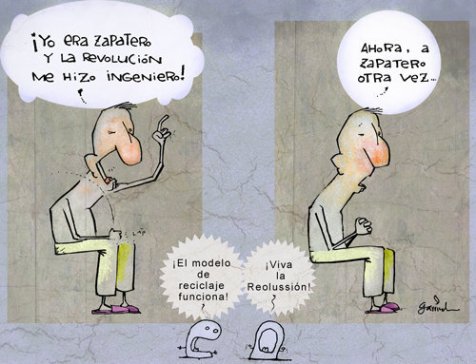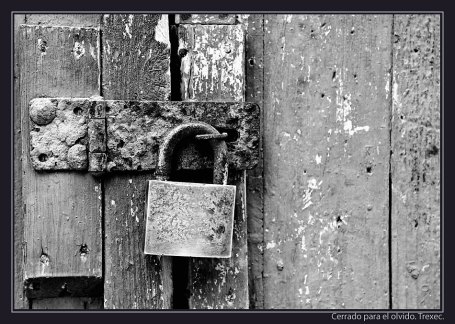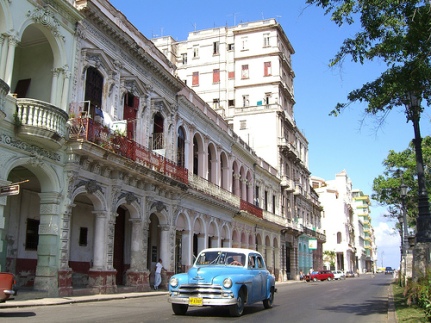
Big guy 1: I was a shoemaker and the Revolution made me an engineer.
Same guy 2: Now I’m a shoemaker again.
1st little guy: The retraining model is working!
2nd little guy: Long Live the Re-Use-Olution
For the forward-looking among us, who lost their jobs before the Government announced its layoffs, the social chess game on this Island of the Absurd has a different connotation. Recent events don’t surprise us too much.
I, who was a pioneer in this expendability, will one day claim my diploma and prize.
So I opened the double pages of the newspaper Granma last Friday with a different mood from most people; less biased, perhaps. More “light.” When you’re already unemployed, little that is printed in the official newspaper frightens you.
Howling with laughter cleared my head. Getting to start the morning roaring gave me another lens through which to write the truth.
I’ve gone over and over the list of 178 new occupations that my Government benefactor has created for the support of its citizens, and every time the scene repeats itself: I start with a suppressed smile, and end up laughing my head off.
Someone told me not long ago: “This is a crazy country.” That is, it is not a country of crazy people, but a nation that has lost its sanity. This time even our leaders have contributed to the joke
I look at the list, ordered alphabetically, and I ask myself if any of these great careers would be suited to my talents as an idled scribe. After discarding “Tutor,” thinking myself lacking in pedagogic talent, I start to sort through them.
As a teenager I never got the chance, during my stay at high school, to climb a coconut palm and tear off its fruit. And not because it might have cost my life; my hunger was so fierce I would have climbed Everest. OK, maybe not this one.
I cross off “Palm Tree Harvester.” I imagine the fortune within my reach, but reason helps me to see my way to refusing it. If starving to death and adolescent hunger weren’t enough to get me to the top of a coconut palm…
2. In my house there’s a talking parrot and a dwarf turtle which, although nearly 20 years old, fits in the palm of a hand. With the profession of “renter of animals” now approved, I searched my brain trying to figure out how I could exploit the pets in my home, and in this way reactivate my non-existent economy.
The parrot is such an egomaniac that 99 percent of its entire repertoire starts with it mumbling its own name. It is also surly and phlegmatic, and I’m sure that the instant someone rents her from me to amuse their family, she will shut her beak entirely until the day of her return.
The turtle has the most boring existence any animal could experience. Except for filling the house with luck with its mystical ways, I see no other utility to it through which I might be able to raise some capital.
3. As the list is explicit, although I was trained in the art of weaving I could not exercise the profession. I would not be safe from doubts and malicious eyes. To acquire a license for an activity that says, with no margin for doubt, “Embroiderer-Weaver,” does not make me feel comfortable.
4. One of the options, which they’ve even marked with asterisks, is “Collector-Payer.” I like the idea of responding, when someone asks me my profession, “Well, I work at collecting and paying.” I could pass for an investor or a businessman, even if my pockets haven’t heard about it. Either way, a certain social recognition would attach to me.
5. Quite the opposite of those who announce their official status as, “Hairdresser for domestic animals.” True, it is an honorable profession where it is practiced, frequently in developed nations. But I automatically distrust the home environment of a girl I just met, for example, who confessed to me that her father earned a living cutting the bangs of poodles in his city.
6. There are some professions recently recognized that need a little public clarification in order to address popular misconceptions. Item number 156 says, “Dandy,” and no one has any idea what could be going on in the minds of our leaders. That said, some of my best friends have started to shave their chests, hone their muscles, and even buy themselves hats and canes. Who knows.
7. On the other hand, the newspaper Granma should have provided some kind of key to go with this compilation of legendary trades of the most mysterious and indecipherable; they need an explanation. I have to confess I couldn’t sleep thinking of the devils who devote themselves to the position of “Button coverer,” or “Book possessor.”* I think my optimism will be confirmed if I find that I am able to support my current and future family through the latter line of work. If they are going to pay me for having books… Hallelujah!
8. Not even the astral world has been passed over by our Government in its effort to provide every Cuban with a living and personal well-being. Now the “Fortuneteller” can read in peace, (license in hand), the future of her client in a deck of cards. Even guessing the fate of the inspectors who ask to see the license for their illuminating work.
Also the “Tropical fruit peeler,” could remove the skins of bananas and mangoes without worrying about being caught out; for a small tax the State will authorize him to devote himself to this juicy business.
The only thing not clear to me is when our sardonic newspaper will publish the tag-line that clarifies everything. The text that finishes off this incredibly original joke with which the highest echelons of power wanted to favor us. For a Creole joke it’s not bad, but we have all laughed heartily already, let them start taking us seriously… Deal?
*Translator’s note: The idea of “Book possessor” is funny in two languages/cultures: English/Spanish; Capitalist/Communist. The term is actually the equivalent to the English “bookkeeper”… But what Cuban keeps books? In the socialist paradise where the State owns all…






